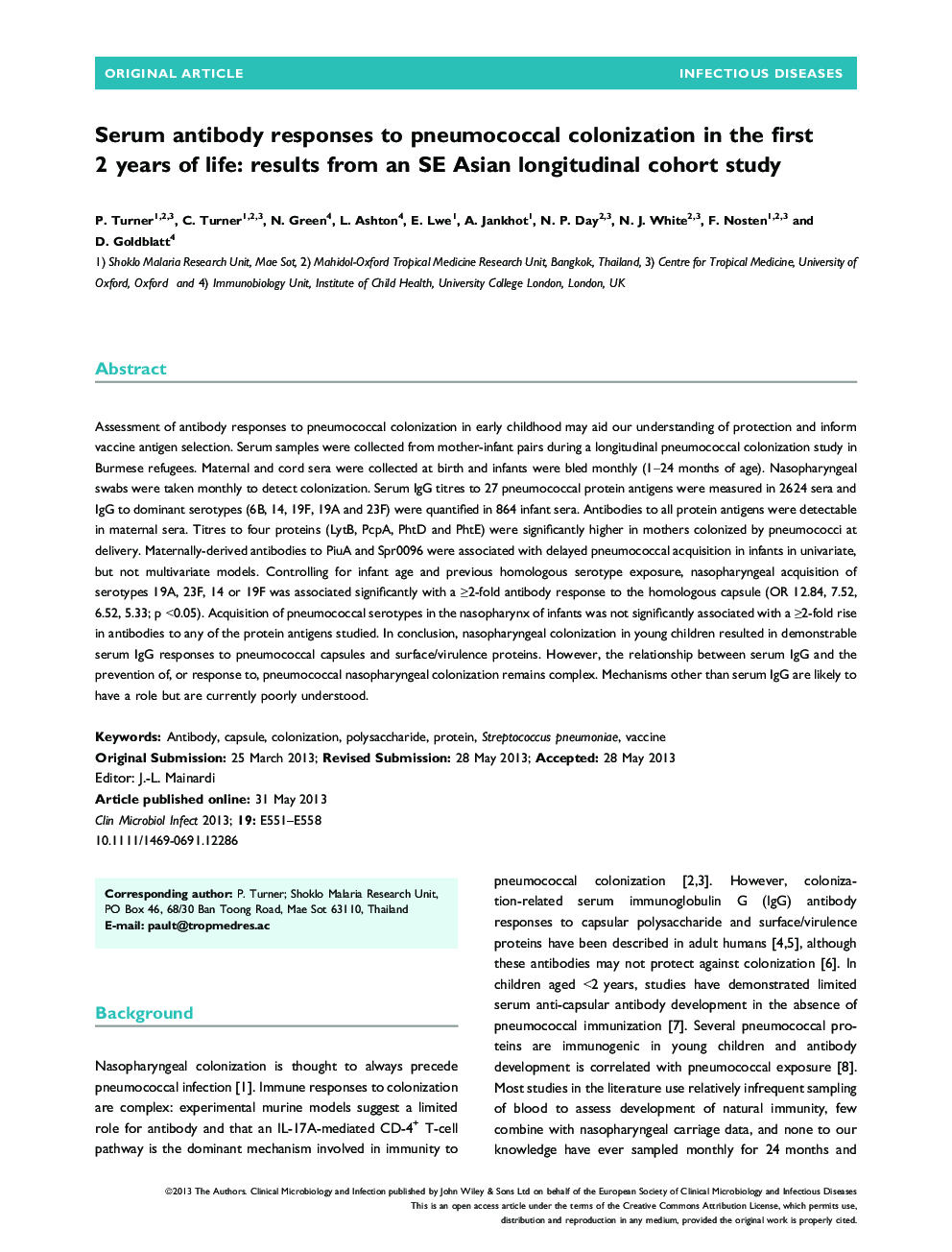| کد مقاله | کد نشریه | سال انتشار | مقاله انگلیسی | نسخه تمام متن |
|---|---|---|---|---|
| 6130519 | 1222175 | 2013 | 8 صفحه PDF | دانلود رایگان |
عنوان انگلیسی مقاله ISI
Serum antibody responses to pneumococcal colonization in the first 2 years of life: results from an SE Asian longitudinal cohort study
ترجمه فارسی عنوان
پاسخ های آنتی بادی سرم به کلونیزاسیون پنوموکوک در 2 سال اول زندگی: نتایج حاصل از مطالعات کوهورت طولی در آسیا
دانلود مقاله + سفارش ترجمه
دانلود مقاله ISI انگلیسی
رایگان برای ایرانیان
کلمات کلیدی
پادتن، کپسول، استعمار، پلی ساکارید، پروتئین، استرپتوکوک پنومونیه، واکسن
موضوعات مرتبط
علوم زیستی و بیوفناوری
ایمنی شناسی و میکروب شناسی
میکروب شناسی
چکیده انگلیسی
Assessment of antibody responses to pneumococcal colonization in early childhood may aid our understanding of protection and inform vaccine antigen selection. Serum samples were collected from mother-infant pairs during a longitudinal pneumococcal colonization study in Burmese refugees. Maternal and cord sera were collected at birth and infants were bled monthly (1-24 months of age). Nasopharyngeal swabs were taken monthly to detect colonization. Serum IgG titres to 27 pneumococcal protein antigens were measured in 2624 sera and IgG to dominant serotypes (6B, 14, 19F, 19A and 23F) were quantified in 864 infant sera. Antibodies to all protein antigens were detectable in maternal sera. Titres to four proteins (LytB, PcpA, PhtD and PhtE) were significantly higher in mothers colonized by pneumococci at delivery. Maternally-derived antibodies to PiuA and Spr0096 were associated with delayed pneumococcal acquisition in infants in univariate, but not multivariate models. Controlling for infant age and previous homologous serotype exposure, nasopharyngeal acquisition of serotypes 19A, 23F, 14 or 19F was associated significantly with a â¥2-fold antibody response to the homologous capsule (OR 12.84, 7.52, 6.52, 5.33; p <0.05). Acquisition of pneumococcal serotypes in the nasopharynx of infants was not significantly associated with a â¥2-fold rise in antibodies to any of the protein antigens studied. In conclusion, nasopharyngeal colonization in young children resulted in demonstrable serum IgG responses to pneumococcal capsules and surface/virulence proteins. However, the relationship between serum IgG and the prevention of, or response to, pneumococcal nasopharyngeal colonization remains complex. Mechanisms other than serum IgG are likely to have a role but are currently poorly understood.
ناشر
Database: Elsevier - ScienceDirect (ساینس دایرکت)
Journal: Clinical Microbiology and Infection - Volume 19, Issue 12, December 2013, Pages E551-E558
Journal: Clinical Microbiology and Infection - Volume 19, Issue 12, December 2013, Pages E551-E558
نویسندگان
P. Turner, C. Turner, N. Green, L. Ashton, E. Lwe, A. Jankhot, N.P. Day, N.J. White, F. Nosten, D. Goldblatt,
